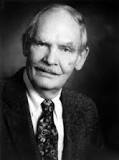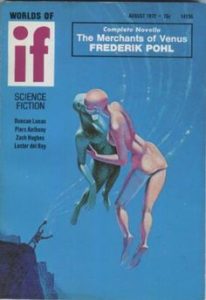 Frederik Pohl was born on this date, November 26, in 1919. He passed away in 2013. Pohl was one of the top science fiction writers of the Twentieth Century. In addition to writing such classics as The Space Merchants (cowritten with C. M. Kornbluth) and the memoir The Way the Future Was, as well as editing Galaxy magazine and being a founding member of the fan group The Futurians, he was an active author until the day he died.
Frederik Pohl was born on this date, November 26, in 1919. He passed away in 2013. Pohl was one of the top science fiction writers of the Twentieth Century. In addition to writing such classics as The Space Merchants (cowritten with C. M. Kornbluth) and the memoir The Way the Future Was, as well as editing Galaxy magazine and being a founding member of the fan group The Futurians, he was an active author until the day he died.
The 1970s was a productive decade for Pohl. Beginning with “The Merchants of Venus”, his Heechee series was highly successful. The first novel, Gateway, won the Hugo, Nebula, and Campbell awards.
The novels revolve around artifacts left millennia ago by a race of aliens called the Heechee. In the novels, brave explorers get in a Heechee vessel and head out to parts unknown. Literally. There is no way to tell where a Heechee vessel is going, how long the trip will take, or what waits at the other end. It could be a fortune, a bust, or a one-way trip.
 What is not as well-known is that the Heechee were first introduced in “The Merchants of Venus”, first published in Worlds of If in the July-August 1972 issue. The space ships haven’t been found yet, but Heechee tunnels under the surface of Venus have. Audee Walthers is a prospector hoping to score a major find. He’s running out of time. He needs a new liver, and soon. If he can’t come up with a way to pay for it, he’s a goner.
What is not as well-known is that the Heechee were first introduced in “The Merchants of Venus”, first published in Worlds of If in the July-August 1972 issue. The space ships haven’t been found yet, but Heechee tunnels under the surface of Venus have. Audee Walthers is a prospector hoping to score a major find. He’s running out of time. He needs a new liver, and soon. If he can’t come up with a way to pay for it, he’s a goner.
Due to the economic constraints of orbital mechanics, tourist ships only show up at certain times on Venus. So when a charter arrives carrying a tycoon from Earth accompanied by a lovely young lady, Audee jumps at the chance to be the man’s guide. But the tycoon has an agenda of his own…
“The Merchants of Venus” is a well-done tale, one of Pohl’s best. It’s not as good as the novels that came later, especially Gateway. As the series went on, some of the mysteries were resolved, which to me killed some of the appeal of the series. The mystery wasn’t as compelling in my mind.
But I digress. Pohl creates a compelling, if slightly flawed, character in Audee. The tension mounts as Audee tries to find a score that will save his life while the time runs out. This is science fiction the way it should be written. It reminded me of why I read so much of Pohl’s work growing up. I first encountered Frederik Pohl’s short fiction in the SFBC edition of The Best of Frederik Pohl (which didn’t contain “The Merchants of Venus”, probably due to length). I was hooked.
I may give the Heechee series a reread soon. I never did get around to reading the final volume (The Boy Who Would Live Forever) that came out in 2004. I’ve also got The Eschaton Sequence sitting on my desk.
If you’ve not read Pohl, or not read the Heechee series, “The Merchants of Venus” is a great place to start.
